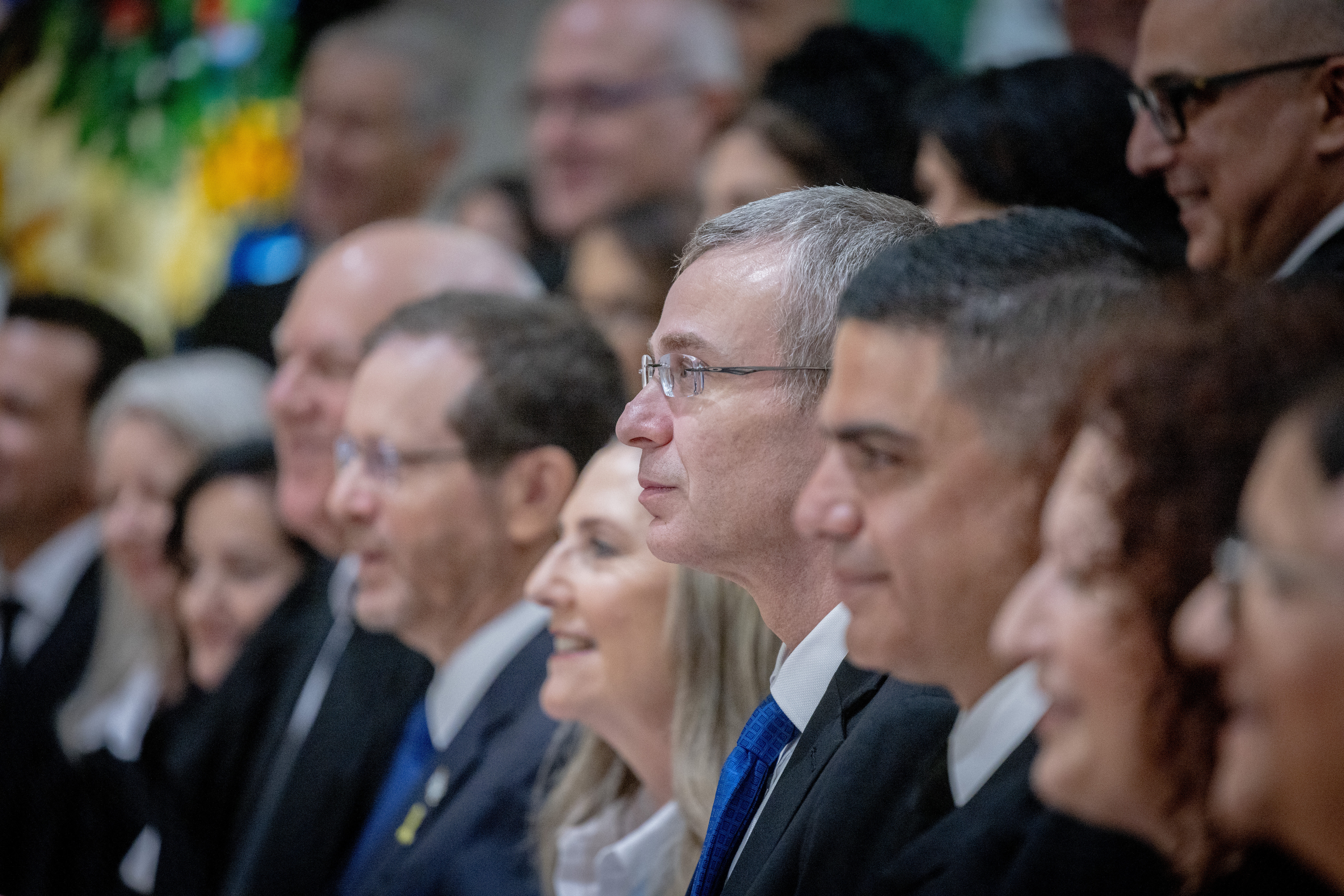“Unity” as a Means to Weaken the Judicial System
While the Israeli public has been focusing on the war and on the hostages in Gaza, the government—led by the minister of justice—has been preparing an assault on the independence of the judicial system.

Yariv Levin at a swearing in ceremony for newly appointed judges. Photo by: Chaim Goldberg/Flash90
While the Israeli public has been focusing on the war and on the hostages in Gaza, the government—led by the minister of justice—has been preparing an assault on the independence of the judicial system. This is a particularly cynical move, making manipulative use of rhetoric about “unity” under fire, in order to advance substantive changes to our constitutional system.
The most salient example is the Judicial Selection Committee. Under a cloak of simulated normality, the justice minister finally agreed to convene the Committee after a long period of suspension, which he was pressured to bring to an end. While the Committee has indeed selected more than 100 judges and court registrars in recent months, there is a sting in the tail: The justice minister is demanding that every selection must be agreed on with a “broad consensus” of the Committee—which in practice means only with his approval. If the justice minister does not get his way, then the open judicial position in question is not brought up for discussion. This is despite the fact that by law, only a regular majority is required for the Committee to select judges to any court (excepting Supreme Court justices, whose selection requires the support of seven of the Committee’s nine members). Appointments are not submitted for discussion even when the opposition to them comes from the members of the Committee who are politicians, who in an unprecedented manner have opposed, for example, the promotion of a judge because she was not sufficiently “nationalist,” in their opinion.
In addition, though a new president of the Supreme Court could have been appointed a while ago, the position has been filled by a temporary replacement for several months. This is because the justice minister refuses to select a president in accordance with the seniority rule that is always applied by the Judicial Selection Committee (that is, selecting the longest-serving Supreme Court justice as president).
Clearly, it is important for there to be agreement on judicial selection, which is how the Judicial Selection Committee has usually operated. Now, however, the justice minister is making cynical use of the rhetoric of “broad consensus” in order to change important informal rules guiding the Committee’s work: the seniority rule, the method for reaching decisions by the Committee, and the irrelevance of political considerations when selecting judges.
The justice minister is also unwilling to advance the appointment of a new ombudsman of the judiciary, to replace the former ombudsman who recently completed his term of office. Once again, the minister is demanding that that the acting president of the Supreme Court agrees to deviate from the defining characteristic of the four ombudsmen who have been appointed since the Ombudsman’s Office was established: all four were former Supreme Court justices. The justice minister wants to appoint a former district court judge instead, and if he does not get his way, then no ombudsman will be appointed, and the public’s complaints about judges will go unanswered.
The issue of unity also arose regarding the representation of the government in the case against giving exemptions from military service to Haredim. While the attorney general allowed the government to hire private counsel for this case, the government wanted this private counsel to be given to all relevant government ministries. Once again, the government cynically used the argument that the state must speak “with one voice” in attempting to deviate from a legal rule that has been in place for decades, according to which it is the attorney general who decides the scope of any private counsel given to the government.
The government is exploiting the fact that all of the above rules that it is attempting to subvert are not grounded in formal legislation. In a recently published large-scale international study that I was part of, researchers from a diverse range of countries noted the great importance of informal rules for understanding the status and functioning of the judicial system. What all of the steps being taken by Israel’s government have in common is that they relate to foundational informal rules that are extremely important for the independence of the judicial system.
In fact, having failed with what it called its “judicial reform” via legislative means, the government has returned to the approach taken by previous Netanyahu governments, of eroding the protective foundations of the independence of the judicial system by informal means. What is particularly galling is its cynicism in the use of the rhetoric of “unity” to advance such deep-seated changes. Anyone truly interested in national unity in wartime should, at the very least, preserve the status of these rules in order to avoid reigniting the internal struggles that preceded October 7.
